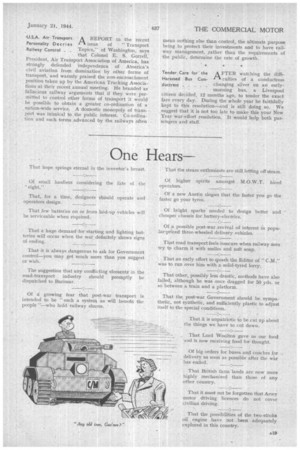One Hears
Page 21

If you've noticed an error in this article please click here to report it so we can fix it.
That hope springs eternal in the inventces breast.
Of small hauliers considering the fate of the eight."
That, for a time, designers should operate and . operators design.
That few batteries on or from laid-up. vehicles will be serviceable when required.
That. a huge demand for starting -and lighting batteries will occur when the war definitely shows signs of ending.
That it is always dangerous to ask for Government control—you may get much more than you suggest or wish.
The suggestion that any conflicting elementsin the road-transport industry should promptly be dispatched to Barimar.
Of a growing fear that post-war transport is intended to be "such a system as will benefit the people "who hold railway shares. That the steam enthusiasts are still,letting off steam.
Of higher spirits amongst M.O.W.T. hired operators.
Of a new Austin slogan that the faster you go the faster go your tyres.
Of bright sparks needed to design better and cheaper chassis for battery-electrics.
• Of a possible post-war revival of interest in popular-priced three-wheeled delivery vehicles.
That road transport feels insecure when railway men try to charm it with smiles and soft soap.
• That an early effort to .quash the Editor of "CM." was to run over him with a solid-tyred lorry.
That other, possibly less drastic, methods have also failed, although he was once dragged for 50 yds. or so between a train and a platform.
That the post-war Government should be sympathetic, not synthetic, and sufficiently plastic to adjust itself to the special conditions.
That it is unpatriotic to be cut up' about the things we have to Ent down,.
That Lord Woolton gave us our food and, is now receiving food for thought. • Of big orders for buses and coaches for delivery as soon as possible after the war has ended.
That British farm 'lands are now more highly mechanized than those of any other country.
That it must not be forgotten that Army motor driving licences do not cover civilian driving. • That the possibilities of the two-stroke oil engine have not been adequately explored in this country.




























































